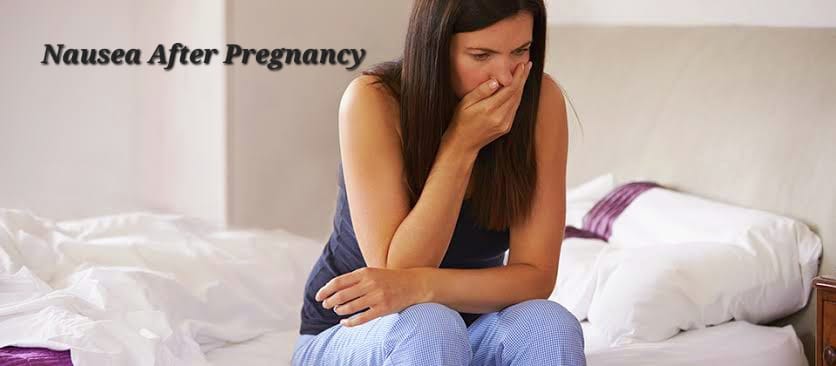Feeling Nausea after Pregnancy
Hormonal changes, exhaustion, stress, or other postpartum illnesses are some of the causes of postpartum nausea, often known as nausea after pregnancy.
Causes of Postpartum Nausea
- Fatigue and Lack of Sleep
Physical stress caused by the duties of caring for a newborn and the fatigue of labor can lead to nausea.
- Changes in Hormones
Pregnancy hormones, including progesterone and estrogen, decrease rapidly after childbirth, which can cause nausea.
- Dehydration
Postpartum nausea can result from dehydration, especially if there was significant blood loss during delivery.
- Anxiety or Postpartum Depression
Postpartum depression and anxiety are examples of mental health conditions that can sometimes manifest as physical symptoms, such as nausea.
- Medicines for Pain
Many pain medications used during or after childbirth, such as spinal anesthesia or epidurals, can have side effects, including nausea. These include opioids.
- Breastfeeding
Some women experience mild nausea while breastfeeding due to the oxytocin hormone.
- Anxiety and Stress
Physical symptoms of nausea can be attributed to the emotional and psychological stress of adjusting to parenthood.
- Gastrointestinal Problems
Nausea can be the result of pre-existing gastrointestinal disorders such as acid reflux or irritable bowel syndrome (IBS) worsening after birth.
Some Tips for Coping with Postpartum Nausea
To manage postpartum nausea, one must treat the underlying causes and take steps to alleviate the symptoms. The following advice may be helpful:
- Eat Light Meals Often
You can avoid nausea and maintain blood sugar levels by eating smaller, more frequent meals. Instead of filling foods, choose simple, easily digestible foods such as bread, crackers, or bananas.
- Limit Your Caffeine Intake
Caffeine can be healthy in moderation, but too much can worsen nausea and cause dehydration. When in doubt, go for the caffeinated option.
- Drink Plenty of Water
Be sure to stay hydrated by drinking plenty of water, especially if you’re breastfeeding. Drink plenty of water throughout the day as dehydration can increase nausea.
- Stay Away From Strong Smells
Strong smells should be avoided as they can cause nausea. This could be delegating the cooking or making sure your space is well ventilated.
- Consider Herbal Remedies
A possible treatment for nausea is aromatherapy using peppermint tea or peppermint oil. Always consult your doctor before using herbal remedies, especially if you are breastfeeding.
- Relax and Take a Rest
Rest at all times, as fatigue can make nausea worse. If you need time to yourself or a nap, consider asking a child for help.
- Slow Motion
If you are sitting or lying down, stand up carefully to prevent lightheadedness and nausea. At times, sudden movements may disturb you.
- Control Your Stress
To reduce stress and anxiety, which can exacerbate nausea, try relaxation techniques such as deep breathing, meditation, or gentle yoga.
- Deal with the Underlying Issues
Get the right medical attention if you believe your nausea is due to an underlying medical condition, such as an infection or digestive problem.
- Medications
If you experience severe nausea, consult your healthcare practitioner about pharmaceutical options. Antihistamines or anti-nausea medications such as ondansetron may be prescribed.
- Talk to a Lactation Specialist
A lactation consultant can offer tips on how to make breastfeeding more comfortable if it’s making you feel uncomfortable.
Conclusion
If your nausea persists or becomes more severe, it is important to consult with your healthcare professional to rule out any major underlying conditions and to pursue additional treatment options.







